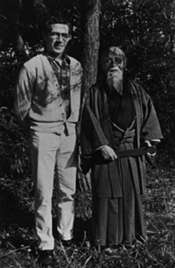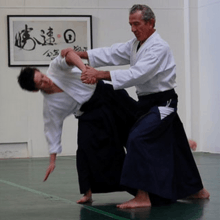Robert Nadeau (aikidoka)

Robert Nadeau (born March 10, 1937) is an American aikido teacher holding the rank of 7th dan and master teacher(Shihan) in the Aikikai. Nadeau began training in martial arts at the age of 16 and began studying Aikido with American instructor Robert Tan.[1]
After Training in Japan with the founder of Aikido, Morihei Ueshiba from 1960-1962 Nadeau returned to Northern California and opened a series of martial art schools sharing space with first Professor Sig Kuferath and then Richard Bunch through whom he has had on-going contact with several notable Ju-Jitsu schools [2] and which eventually led to the formation of the California Aikido Association.[3] He is one of three division heads of the California Aikido Association and holds a teaching certification signed by Morihei Ueshiba and Kisshomaru Ueshiba. He is also the founder and head instructor of City Aikido of San Francisco, Aikido of San Jose and Aikido of Mountain View, CA.
Nadeau is well known as a pioneer in the energy and awareness aspects of aikido, having committed his martial arts career to understanding and translating these principles handed down by Ueshiba into fields beyond aikido, including psychotherapy, personal development, performance, and business.[4][5][6][7]
Relationship with Morihei Ueshiba
In addition to his enrollment as an Aikido student at Hombu Dojo from 1960-1962 and maintaining a full training and meditation practice during his time in Japan, Robert had a close and substantial off-the-mat relationship with Morihei Ueshiba, which included regular extended trips to the Japanese countryside. Nadeau also assumed the position of publisher of an English-language newsletter about aikido while studying in Japan. Through the format of asking questions during small and sometimes private meetings, Nadeau learned first-hand some of the ideas and philosophies that Ueshiba wished to pass on to interested students. Fundamental among these teachings was the concept of "two forces" that combine to produce a new identity and "levels" which progress from limited to enhanced capabilities and awareness. Nadeau refers to the process of moving from one level to the next as an Alchemical transformation. According to Nadeau, this progression occurs in the "functioning realm", i.e. in a manner that improves functioning in everyday life.
Teaching Lineage

Morihei Ueshiba spoke of Izanagi (male) and Izanami (female), the two great forces that, in Shinto mythology, created the islands of Japan. Or again, he spoke of Fire - Water - Steam as another example of two forces combining to yield a third transformed entity. These alchemical concepts have infused Nadeau's teaching since his return from his studies with Ueshiba in Japan in the early 1960s. As a reminder of these direct transmissions, Ueshiba presented Nadeau with a scroll that translates as ""Do the aikido that cannot be seen with the human eye" (note scroll in background).
Publications
- "O Sensei's Process, This DVD provides an outline of O-Sensei’s approach to training in a step-by-step process.[8]
- Nadeau has not published any books or recent writings of his own; further information about him is available in many books about aikido and as well as this list Further reading
- The Moon Sensei YouTube channel publishes a video magazine centered around the ongoing evolution of Robert Nadeau's teachings
Seminars
Nadeau travels around the world regularly teaching workshops across the United States, Switzerland, Israel and New Zealand
References
- ↑ "Robert Tan".
- ↑ 1965 Black Belt Magazine.
- ↑ "California Aikido Association".
- ↑ George Leonard, The Ultimate Athlete. Revising Sports, Physical Education and the Body, The Viking Press 1975.
- ↑ Richard Strozzi Heckler, The Anatomy of Change. East/West Approaches to Body/Mind Therapy, Shambhala Publications 1985.
- ↑ Aikido in America pg 57
- ↑ Stone, John (1995). Aikido In America. Frog Books. p. 57. ISBN 1883319277.
- ↑ "O Sensei's Process, http://blog.aikidojournal.com/2011/06/16/new-dvd-on-o-senseis-process-by-robert-nadeau-sensei/
Further reading
- Stone, John and Meyer, Ron (eds.) Aikido in American North Atlantic Books 1995. ISBN 1-883319-27-7
- Perry, Susan Remembering O-Sensei Living and Training with Morihei Ueshiba, Founder of Aikido
- Leonard, George Way of Aikido, The: Life Lessons from an American Sensei: Life Lessons from an American Sensei
- Palmer, Wendy The Intuitive Body Aikido as a Clairsentient Practice
- Siegel, Andrea Women in Aikido
- Meyer, Ron and Reeder, Mark Center: The Power of Aikido
- Suenaka, Roy and Watson, Christopher Complete Aikido: Aikido Kyohan : The Definitive Guide to the Way of Harmony
- Leonard, George Burr The Ultimate Athlete 2000.
- Fields, Rick The Awakened Warrior New Consciousness Reader 1994.
External links
- Pranin, Stanley Aikido Journal 1999
- California Aikido Association California Aikido Association
- "World Famous Aikido Sensei's: "The Sensei Series"". Firelight Films. Archived from the original on June 24, 2011. Retrieved April 18, 2015.